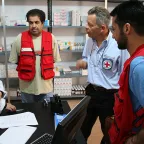Common ethical principles of health care in conflict and other emergencies
… have adopted the " Ethical Principles of Health Care in Times of Armed Conflict and Other … by the ICRC through the Health Care in Danger initiative shows that, in armed …
… have adopted the " Ethical Principles of Health Care in Times of Armed Conflict and Other … by the ICRC through the Health Care in Danger initiative shows that, in armed …

… at the launch of our "Ethical principles of health care in times of armed conflict and other … Crescent Movement, began the Health Care in Danger project. The latest report on violent …
… mark the launch of The Ethical principles of health care in times of armed conflict and other … code of ethics, already signed by five major health care organizations representing 30 …
… of Operations and the heads of four major health care organizations. Babak Ali Naraghi, Head of the Health Care in Danger project, explaining how the ICRC …
… at the launch of the " Ethical Principles of Health Care in Times of Armed Conflict and Other … Crescent Movement, began the Health Care in Danger project. The latest report on violent …
… sustained material damage. Because of the dangers of the in-close fighting, doctors and … arrived at the hospital in need of medical care. Given the generalized sense of … the fighting are also left with minimal health services. Kodok Hospital normally …
… worked with NSAGs in the framework of the "Health Care in Danger" project. Violence against patients and …

… The impact of violence on health-care workers was a central topic at the 20th … future generations of doctors, discussed the dangers they may encounter in the future. *** …
… of violence, actual and threatened, against health care in armed conflicts and other emergencies? … health-care delivery. Read: Health Care in Danger Newsletter, January-June 2015 …
… How can we protect hospitals, health care workers and patients from attacks? The June Newsletter of the Health Care in Danger project brings you interesting examples …

Try one of the following resources:
Created in 1863, the ICRC library, alongside the ICRC archives, provides an indispensable documentary reference on the organization itself and international humanitarian law.
International humanitarian law is based on a number of treaties, in particular the Geneva Conventions of 1949 and their Additional Protocols, and a series of other instruments.
Customary international humanitarian law consists of rules that come from "a general practice accepted as law" and that exist independent of treaty law.